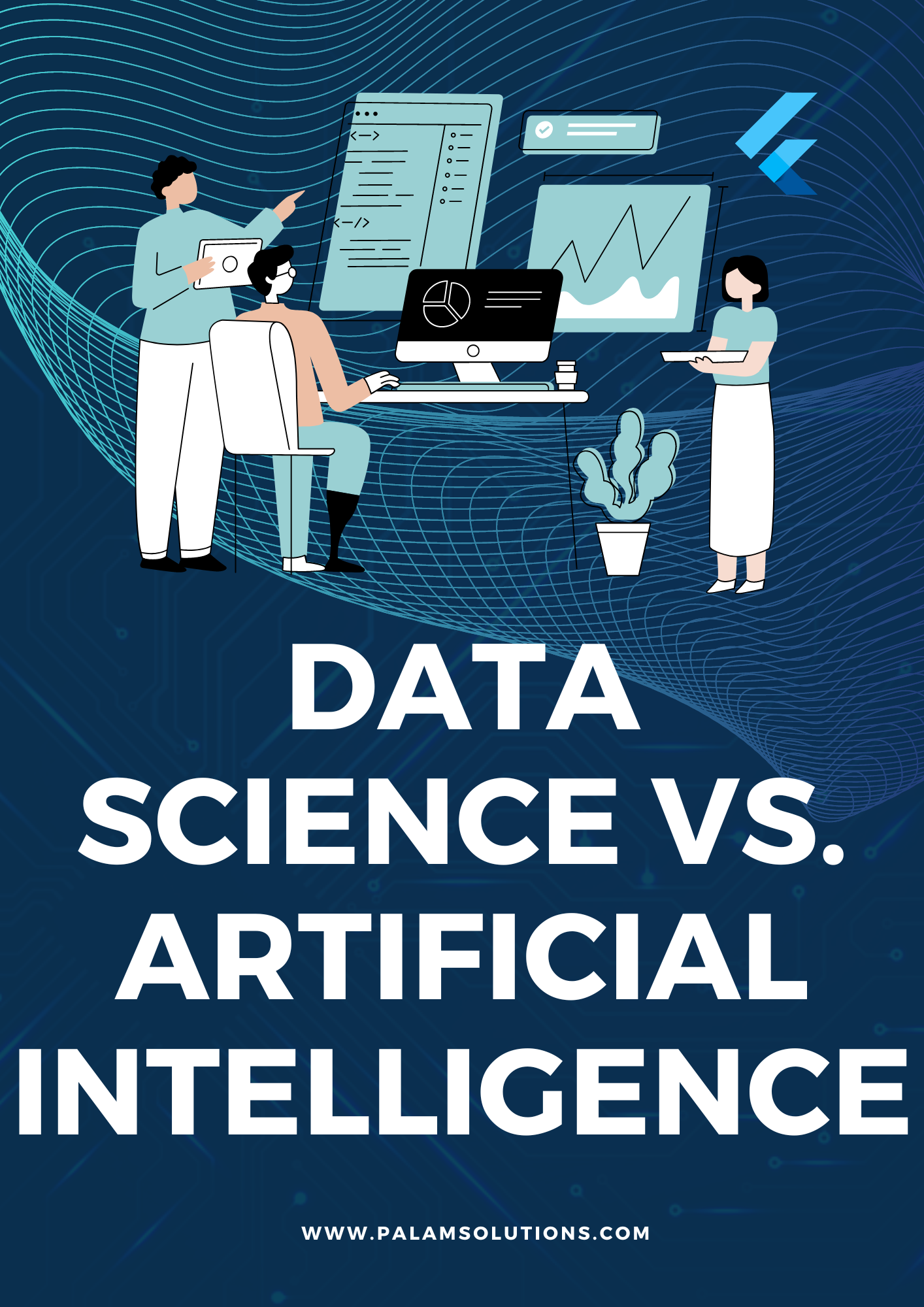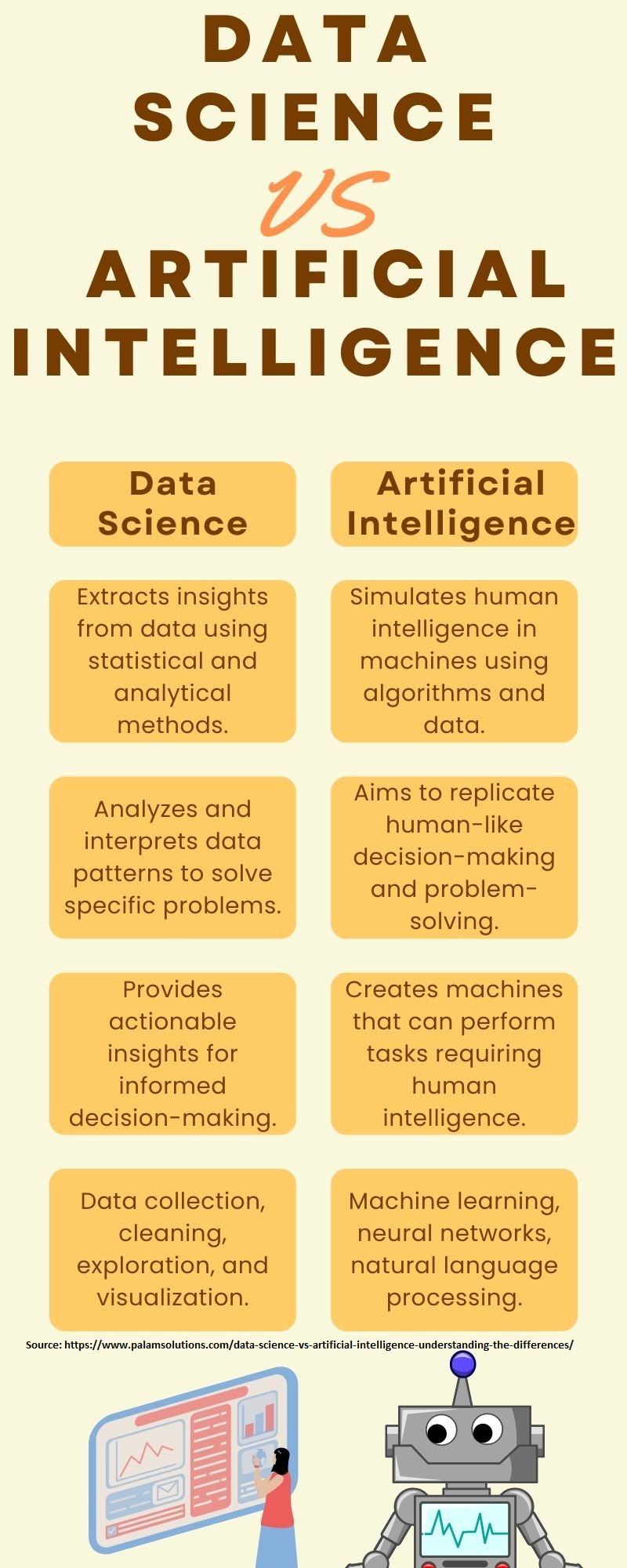
- August 19, 2023
- admin
- Artificial Intelligence, Business, Data Science, Social Media, Technology
In the fast-evolving landscape of technology, two terms have garnered significant attention: data science and artificial intelligence (AI). While often used interchangeably, these terms refer to distinct concepts with unique roles in driving innovation. In this article, we’ll delve into the differences between data science and artificial intelligence, exploring their synergies, applications, and significance in today’s world.

Understanding Data Science:
Data science is a multidisciplinary field that involves extracting knowledge and insights from data through various techniques such as statistical analysis, data visualization, and machine learning. It revolves around the collection, cleaning, and analysis of vast amounts of data to uncover patterns and trends that can inform decision-making. Data scientists play a pivotal role in transforming raw data into actionable insights that drive business strategies, enhance user experiences, and improve processes.
Decoding Artificial Intelligence:
Artificial Intelligence, on the other hand, focuses on creating machines and systems capable of simulating human intelligence. AI encompasses a broad spectrum of technologies, including machine learning, natural language processing, and computer vision. It enables computers to perform tasks that typically require human intelligence, such as recognizing speech, making decisions, and learning from experience. AI systems learn from data and iteratively improve their performance over time.
Interplay and Intersection:
Data science and artificial intelligence are closely intertwined. Data science provides the foundation for AI by supplying the necessary data and insights to train machine learning algorithms. The success of AI models relies heavily on the quality and quantity of the data they are trained on, making data science a crucial component in AI development. Conversely, AI can enhance data science by automating data analysis, identifying patterns at scale, and enabling predictive modeling.
Real-World Applications:
Both data science and artificial intelligence have a wide range of practical applications across industries. Data science powers recommendation systems in e-commerce, fraud detection in finance, and personalized medicine in healthcare. AI-driven technologies enable virtual assistants, self-driving cars, and sentiment analysis for social media. Together, they enable businesses to make informed decisions, automate processes, and create innovative solutions.
Conclusion:
In the dynamic world of technology, data science and artificial intelligence are integral players, each contributing its unique strengths to innovation and progress. Data science forms the bedrock of AI development, providing the data and insights needed for intelligent systems to thrive. As businesses and industries continue to harness the power of data and AI, understanding the distinctions between these two concepts becomes paramount for anyone seeking to navigate the rapidly evolving technological landscape.
In summary, data science and artificial intelligence are not competitors, but rather collaborators that work in tandem to transform data into actionable intelligence and simulate human-like thinking in machines. Their synergy promises a future where data-driven insights and intelligent systems drive unprecedented advancements across various domains.
Categories
- Artificial Intelligence (19)
- Bigquery (7)
- Business (38)
- Chat GPT (6)
- Code (5)
- Data Science (23)
- Data Visualization (28)
- Google Ads (4)
- Google Analytics (19)
- Google Analytics 4 – GA4 (22)
- Google Bard (5)
- Google Cloud (6)
- Google Looker Studio (4)
- Google merchant center (2)
- Google tag manager (10)
- Healthcare (2)
- Hindi (6)
- Javascript (3)
- Migration (1)
- Natural Language Processing (5)
- NLP (3)
- Prestashop (3)
- Reports (10)
- SEO (1)
- Server-Side Tracking (10)
- Social Media (15)
- Technology (35)
- web design (2)
- web development (5)
- आर्टिफिशियल इंटेलिजेंस (5)
- एआई (5)
- कृत्रिम बुद्धिमत्ता (6)
- गूगल बार्ड (3)
- डेटा विज्ञान (1)
- डेटा साइंस (1)




